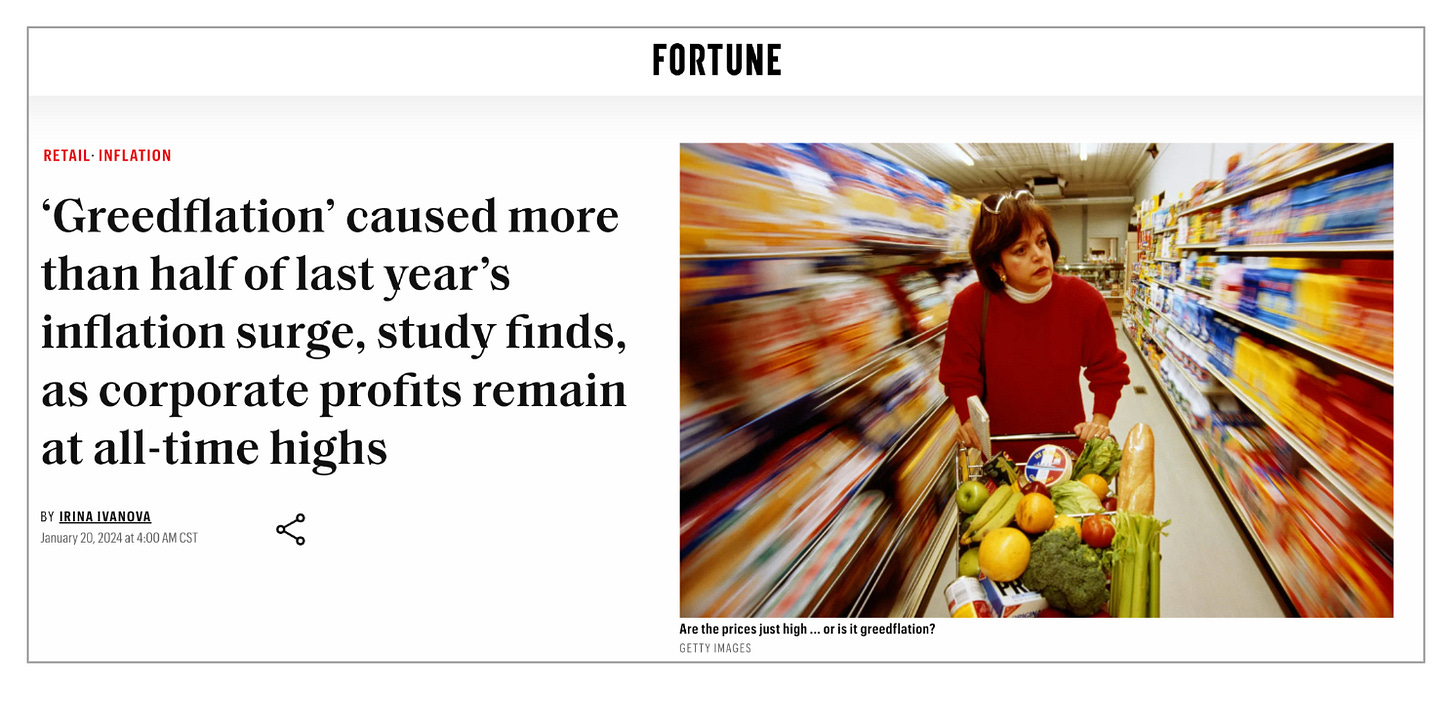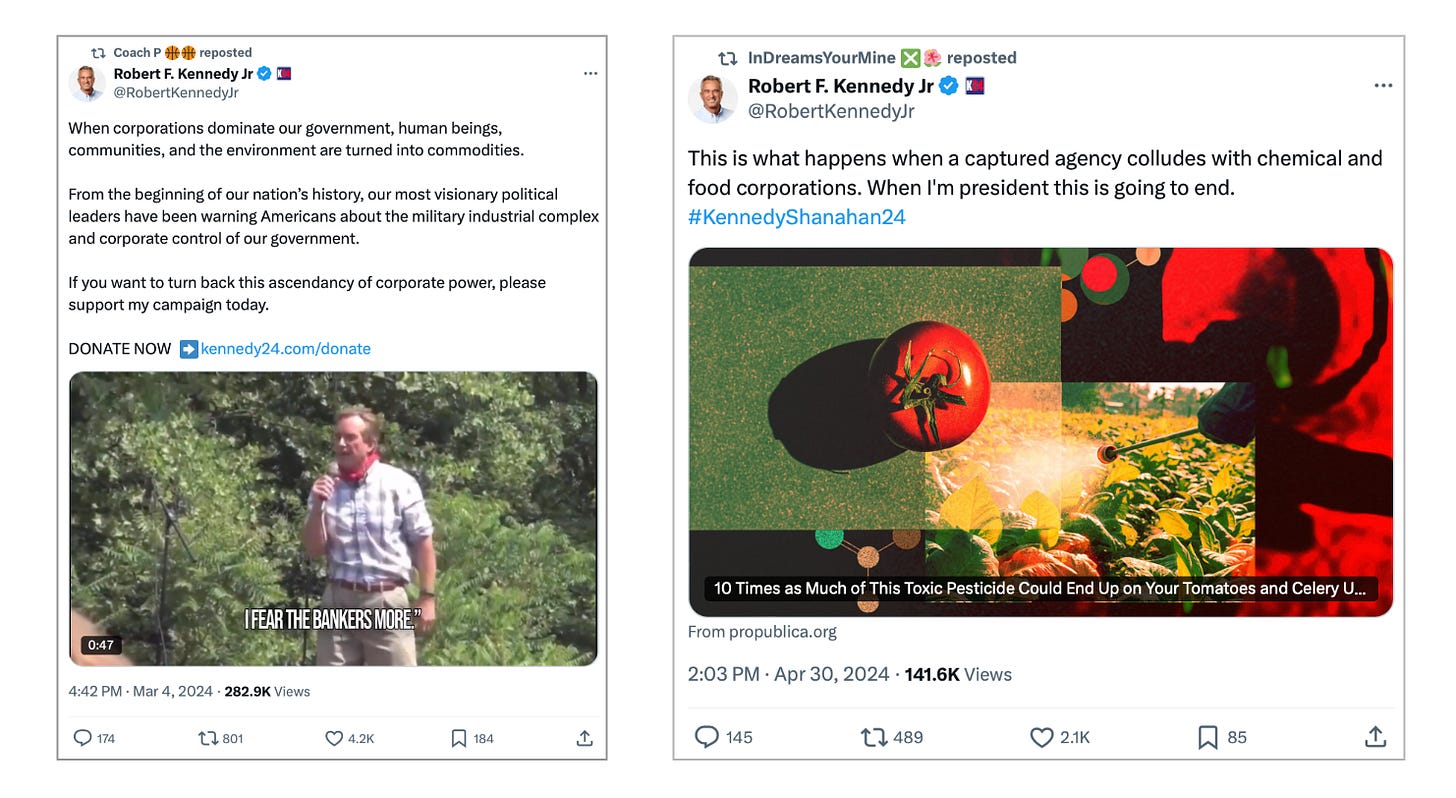How Trump Used RFK Jr. To Harness Anti-Corporate Anger
Pro-Trump influencers pushed RFK Jr.'s anti-corporate message far more than pro-Harris influencers mentioned corporate price gouging. It may have been decisive.
Since the 2020 pandemic, one of the most consistent findings I’ve seen on social media was evidence of deep anger at corporations. Truly, corporations have given Americans plenty to be angry about lately, both profiteering off the pandemic while underpaying and often mistreating their essential workers and then turning around and doubling the post-pandemic inflation crisis with price gouging.
Polls have also shown evidence of the recent deterioration American faith in corporations - the percentage of Americans who told Gallup they have a “great deal” or “quite a lot” of confidence in big business has gone from 23% in pre-pandemic 2019 to 16% in 2024, and at the same time the number who said they have “very little” confidence in big business has gone from 32% to 41%. Correspondingly, support for the labor movement has been growing since 2020, so much that in the fall of 2024, approval for unions fighting on behalf of workers against corporate power was higher than at any point since the mid-1960s.

By September of 2023, as the trend was showing up in nearly every social media conversation I was analyzing, I wrote a newsletter showing that frustration with corporations was both widespread and bipartisan. And Democrats appeared well-positioned for this opportunity - leaders like Elizabeth Warren, Bernie Sanders, AOC, and Katie Porter had spent years strengthening the party’s anti-corporate bona fides.
Which is why I thought that one of Trump’s biggest liabilities was his coziness with corporate America - his first-term corporate tax cuts, his buddies at Mar-a-Lago, his request for a $1 billion bribe from energy companies in exchange for letting them have their way with cutting regulations - the ads seemed to write themselves. Trump looked like the absolute worst candidate for Republicans to run in a time of such antipathy toward corporations.
Sometime in the spring of 2024, though, I started taking note of RFK Jr.’s message and warning signs started flashing. Kennedy was running as an independent candidate, making a play for disaffected voters who thought both sides were bought and paid for by corporate America. With relentless focus, Kennedy’s message claimed that the regulatory agencies that were supposed to protect us were in fact captured by the industries they were regulating.
Democrats mostly treated RFK Jr. like a joke, fixating on his personal scandals and oddities, of which there were many, or his longtime crusade against vaccines, which Democrats assumed would be automatically disqualifying to most Americans.
Still, his support was consistent at around 10% of the national electorate in most 2024 polls, until President Biden withdrew from the race and Kennedy’s supporters flocked to Vice President Harris by a factor of 2-to-1.
When Kennedy endorsed Trump in the midst of the Harris campaign’s summertime honeymoon phase, it looked to many Democrats like a Hail Mary from the Trump campaign that would further alienate Americans nervous about Trump, “weird” J.D. Vance, and Project 2025.
Social media was telling a different story.
Shortly after Vice President Harris was nominated, the Harris campaign and their allies made an initial bid to harness anti-corporate sentiment, focusing on price gouging. Pushback from the right was both immediate and familiar - Trump put out a statement calling the plan “Soviet style price controls,” for example - and in the weeks and months that followed, the Harris campaign and its online allies de-emphasized this aspect of Harris’ pitch to voters:
However, shortly after the Harris campaign’s proposal, RFK Jr.’s “Make America Healthy Again” message was being shared widely by right-wing influencers and other sympathetic allies in the wellness and anti-vaccination communities. The MAHA message explicitly focused on fighting corporate control over our food and drug industries.
Here is the same chart as above, compared with mentions of the phrase “Make America Healthy Again” or its corresponding hashtags (#MAHA / #MakeAmericaHealthyAgain). Note the high point the day Kennedy gave a speech endorsing Trump - that speech was spread far and wide by influencers with more than 10K followers:
And the influencer campaign’s amplification of the message caused it to spread among non-influencers, who are far more numerous.
Here is a chart of posts from accounts with fewer than 10K followers mentioning the same topics:
Note one small but important difference: the influencers were slightly more likely than non-influencers to share the MAHA posts versus the corporate price gouging/profiteering/greed posts. The total share of influencer posts sharing MAHA vs. the Harris/Walz message was 67%, while the total share of non-influencers sharing the MAHA message was 64%.
To me, this suggests that with a greater push from influencers on the left, the Harris/Walz message might have received a more enthusiastic response from non-influencers (i.e. regular folks), since the MAHA campaign appears to be more top-down.
It also suggests the power of influencers to shape the discourse, and one of the main influencers spreading the MAHA message was of course RFK Jr. himself. Elon Musk’s takeover of Twitter/X surely helped spread Kennedy’s message on that platform, but that wasn’t the only place Kennedy was active. On TikTok, for example, Kennedy’s posts with the MAHA message did extraordinary numbers, right up to the week before Election Day when one of his posts was shared more than 100K times:
And on Instagram, though there were fewer overall posts with MAHA hashtags than other platforms, 63% of all posts were from women, and 62% were people between the ages of 35 and 55:
Note also the overwhelmingly positive sentiment expressed in these Instagram posts. Sentiment analysis of political rhetoric can be fuzzy at best, mostly because any political debate is going to generate a ton of language the AI interprets as negative. Harsh words expressed in a post about a political topic don’t necessarily indicate support for or opposition to a topic. What’s unusual, though, is when the words expressed about a political topic - especially one associated with MAGA - are detected as being positive by a factor of around 3-to-1.
In a post-election memo, Senator Chris Murphy shared polling that showed 82% of his constituents agreed with the statement that one of America’s biggest problems is too much corporate power and too little government action to fight against it. This included 89% of Democrats, 81% of Independents and 69% of Republicans. The opportunity to connect with voters on this issue was real, and the Trump campaign appears to have successfully used RFK Jr. to take advantage of it. Whether or not the Trump administration follows through with any MAHA initiatives remains to be seen, of course, and Trump is currently packing his future administration with billionaires. But Democrats clearly had a chance to channel the anti-corporate anger in America and they mostly chose a different path, leaving room for Kennedy to swoop in and help Trump ride that anger to the White House.








